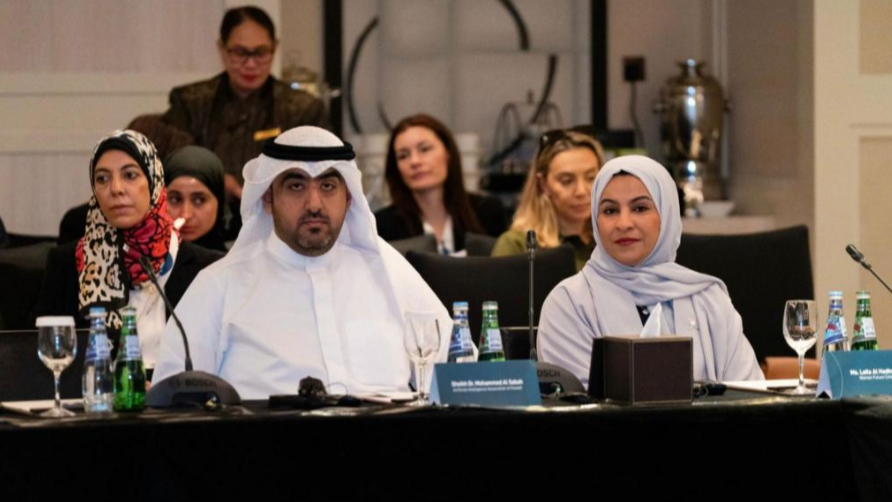Sheikh Mohammed Al-Sabah (L), chairman of Kuwait's Association of Artificial Intelligence of Things (AAIOT), a government agency promoting AI and Intelligence of Things (IOT) awareness, research, and adoption, attends an event in Doha, Qatar, April 24, 2025. (Xinhua)
KUWAIT CITY, Nov. 1 (Xinhua) -- China is illuminating the world's digital future with "responsible artificial intelligence (AI) technology and a human-centered vision" through its achievements in innovation and digital governance, a Kuwaiti official said.
In a recent exclusive interview with Xinhua, Sheikh Mohammed Al-Sabah, chairman of Kuwait's Association of Artificial Intelligence of Things (AAIOT), a government agency promoting AI and Intelligence of Things (IOT) awareness, research, and adoption, praised China's leading role in global AI development and digital transformation.
He explained that China is not merely building factories but shaping "a new philosophy of the relationship between humans and machines." By placing AI at the core of its national strategy and guiding it with science, ethics, and human-centered principles, China has presented the world "a model that combines technological strength with moral responsibility."
With strategic foresight and long-term planning, Sheikh Mohammed said, China has become "a pillar shaping the world's digital future." He emphasized that China is not merely competing in the global AI race but guiding the world toward "a wiser and more responsible application of artificial intelligence."
Regarding the digital transformation of Kuwait and the wider Gulf region, Sheikh Mohammed noted that "the future of cities is built on ideas, not just on oil." He said Kuwait is steadily advancing toward its "New Kuwait 2035" national vision, focusing on developing data- and innovation-driven infrastructure while promoting systematic progress in digital identity, smart education, and sustainable energy.
"We are building the infrastructure of thought -- the very root of a digital nation," he said, while acknowledging that Kuwait still faces challenges such as a shortage of skilled professionals, a weak innovation ecosystem, and the need for more advanced data governance regulations.
Challenges in Gulf countries, including talent shortages, weak innovation capacity, and regulatory lag, represent opportunities for deeper cooperation between China and the Gulf states, he said.
Sheikh Mohammed suggested that both sides could work together to establish high-performance computing centers, develop smart cities, train applied AI professionals, and jointly formulate ethical standards for AI to help build a global digital governance system that balances efficiency with human values.
He highlighted China's Digital Silk Road initiative as "a bridge of light connecting Asia and the Gulf," opening new avenues for cooperation in green energy, smart education, and joint research and laboratory development.
Looking ahead, Sheikh Mohammed expressed strong confidence that the next five years will witness "a new model of cooperation between Kuwait and China -- one born not from corporate contracts, but from shared dreams."
He said key areas of partnership will include smart cities, green energy, smart education, and digital healthcare, noting that Kuwait's Silk City, a major infrastructure project in northern Kuwait, and Gateway Smart City, a flagship smart city initiative, will stand as landmarks of this collaboration.




 A single purchase
A single purchase









